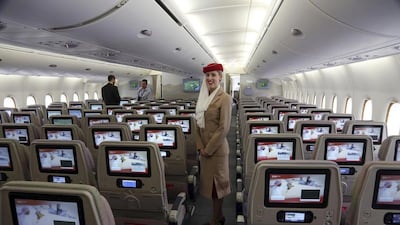DUBAI // High-flying careers could be putting pilots and cabin crew at an increased risk of osteoporosis after new research found a link between sleep deprivation and bone loss in young adults.
A University of Colorado study found sleep-deprived younger men (aged 20-27) have reduced levels of a bone formation marker in blood when compared to older males.
Researchers claimed the continuous limitation on good sleep and disturbances to the body’s internal clock caused by frequent flying and irregular working hours could be a reason for bone loss in young adults.
The findings are significant for the hundreds of thousands of cabin crew and pilots who are based in the Middle East.
Study participants fell asleep each day four hours later than they did the previous day to create a 28-hour day.
They also slept for fewer than six hours a day, replicating the effects of working split-shifts or jet lag because of accruing frequent flyer miles for work. They were monitored over three weeks.
Younger men with disrupted sleep patterns showed a 27 per cent reduction in the bone growth marker, compared with 18 per cent in older men.
Dr Ottmar Gorchewsky, a specialist orthopaedic surgeon at Burjeel Hospital for Advanced Surgery in Dubai, said the results clearly showed a link between sporadic sleep patterns and bone metabolism, leaving frequent flyers vulnerable to osteoporosis.
“The study shows that sporadic sleep patterns affects bone metabolism quite early in life – especially at a time when bone growth is essential for skeletal health longevity,” he said.
“When the old bone breaks down and no new bone forms in its place, the bone loss window can lead to osteoporosis.
“In osteoporosis, bones become weak and brittle and this hereby increases the risk of fractures.
“This lifestyle can have serious implications for the future, leading to conditions such as osteoporosis and making them more susceptible to fractures.
“The longer the flight, the more risks there are.”
Osteoporosis is characterised by low bone mass and structural deterioration of bone tissue, resulting in increased fragility and susceptibility to fracture.
Dr Abdul-Razzak Alamir, a consultant endocrinologist at NMC Royal Hospital in Abu Dhabi’s Khalifa City, said a healthy lifestyle, stopping smoking and regular exercise could counteract damage to bone caused by changes in circadian (daily) rhythms.
“Considering that pilots and cabin crew are exposed much more to circadian rhythm disturbance going through different time zones frequently during their work, the risk is expected to be higher than in other people,” he said.
Deep venous thrombosis, or blood clots in the legs, is a further risk for frequent flyers, caused by sitting still for long hours on an international flight.
Other risk factors could also be contributing to the onset of osteoporosis, said Dr Alamir.
“In a previous study regarding night shift workers and risk of osteoporosis, the condition developed in post-menopausal women after eight years of follow-up,” he said.
In February, a two-year study into the prevalence of osteoporosis in the UAE was launched by the Al Jalila Foundation and the Dubai Bone and Joint Centre.
The study of 2,500 people will shed light on the effectiveness of preventive measures, and the importance of early diagnosis and treatment.
Dr Firas Husban, an orthopaedic surgeon at Burjeel Hospital, said osteoporosis is rare in younger people, as screening is done in the over 45s, so some younger people will only be diagnosed if they arrive in hospital with a break.
“It is a silent disease, and can only be picked up if there has been a fracture or an injury,” he said.
“There is specialist screening, but we try to focus more in prevention in younger people to strengthen their bones to offer more protection.
“We can perform a test or special scans that can display bone weakness as a result of other disease. We know patients under stress who work long, irregular hours who do not look after their bodies are at greater risk.”
nwebster@thenational.ae
nwebster@thenational.ae


